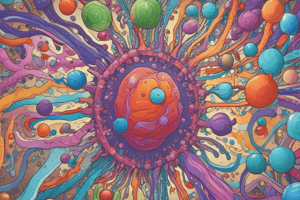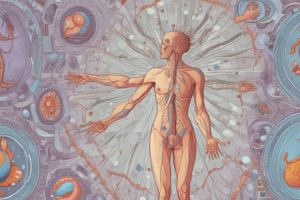Podcast
Questions and Answers
What is the primary role of antibodies in the immune response?
What is the primary role of antibodies in the immune response?
- Producing immune memory cells.
- Activating phagocytes for immediate defense. (correct)
- Forming physical barriers to pathogens. (correct)
- Neutralizing toxins and pathogens.
Which cells are primarily responsible for cell-mediated immunity?
Which cells are primarily responsible for cell-mediated immunity?
- B cells.
- Cytotoxic T cells. (correct)
- Phagocytes.
- Natural killer cells.
What is the main difference between humoral and cell-mediated immunity?
What is the main difference between humoral and cell-mediated immunity?
- Humoral immunity is non-specific; cell-mediated is specific.
- Humoral immunity involves T cells; cell-mediated involves B cells.
- Humoral immunity occurs faster than cell-mediated immunity.
- Humoral immunity is mediated by antibodies; cell-mediated by T cells. (correct)
What characterizes adaptive immunity compared to innate immunity?
What characterizes adaptive immunity compared to innate immunity?
Which type of vaccine contains a weakened form of the pathogen?
Which type of vaccine contains a weakened form of the pathogen?
What is the function of helper T cells in the immune system?
What is the function of helper T cells in the immune system?
What occurs during the primary immune response to an antigen?
What occurs during the primary immune response to an antigen?
What is an example of an immune disorder characterized by overreaction to harmless substances?
What is an example of an immune disorder characterized by overreaction to harmless substances?
Flashcards are hidden until you start studying
Study Notes
Overview of Immunology
- Definition: The study of the immune system, its functions, and its role in protecting the body against disease.
Immune System Components
-
Innate Immunity:
- First line of defense.
- Non-specific responses to pathogens.
- Key components:
- Physical barriers (skin, mucous membranes).
- Chemical barriers (antimicrobial peptides, enzymes).
- Cellular responses (phagocytes, natural killer cells).
-
Adaptive Immunity:
- Specific responses to particular pathogens.
- Involves memory cells for faster response upon re-exposure.
- Key components:
- T cells (helper T cells and cytotoxic T cells).
- B cells (produce antibodies).
Immune Responses
-
Humoral Immunity:
- Mediated by B cells and antibodies.
- Antibodies neutralize pathogens and mark them for destruction.
-
Cell-Mediated Immunity:
- Mediated by T cells.
- Cytotoxic T cells destroy infected or cancerous cells.
- Helper T cells activate other immune cells.
Antibodies
-
Structure:
- Y-shaped proteins produced by B cells.
- Consist of heavy and light chains.
-
Functions:
- Neutralization of toxins and pathogens.
- Opsonization (marking pathogens for phagocytosis).
- Activation of the complement system.
Immune Memory
-
Primary Response:
- Initial exposure to an antigen leads to the activation and proliferation of specific lymphocytes.
- Takes time to develop (days to weeks).
-
Secondary Response:
- Faster and more robust response upon re-exposure to the same antigen.
- Memory cells quickly recognize and respond to the antigen.
Vaccination
- Purpose: To stimulate the adaptive immune response without causing disease.
- Types:
- Live attenuated (weakened form of the pathogen).
- Inactivated (killed pathogen).
- Subunit (parts of the pathogen).
- mRNA (genetic instructions for the body to produce a part of the pathogen).
Immune Disorders
-
Autoimmunity:
- Immune system mistakenly attacks the body's own cells (e.g., lupus, rheumatoid arthritis).
-
Allergies:
- Overreaction of the immune system to harmless substances (allergens).
-
Immunodeficiency:
- Reduced or absent immune response (e.g., HIV/AIDS).
Key Terms
- Antigen: Any substance that triggers an immune response.
- Pathogen: A microorganism that can cause disease (e.g., bacteria, viruses).
- Phagocytosis: Process by which immune cells engulf and destroy pathogens.
Conclusion
- Understanding immunology is crucial for developing vaccines, treating diseases, and managing immune-related disorders. The immune system is a complex network that plays a vital role in maintaining health and combating infections.
Overview of Immunology
- Study of the immune system, its functions, and its protective role against diseases.
Immune System Components
- Innate Immunity:
- Acts as the first line of defense.
- Provides non-specific responses to pathogens.
- Key components include:
- Physical barriers: skin, mucous membranes.
- Chemical barriers: antimicrobial peptides, enzymes.
- Cellular responses: phagocytes, natural killer cells.
- Adaptive Immunity:
- Delivers specific responses to pathogens.
- Utilizes memory cells for improved response to previously encountered pathogens.
- Key components involve:
- T cells: helper T cells enhance immune response, cytotoxic T cells target and destroy infected cells.
- B cells: produce antibodies that neutralize pathogens.
Immune Responses
- Humoral Immunity:
- Involves B cells and the production of antibodies.
- Antibodies help neutralize pathogens and facilitate pathogen destruction.
- Cell-Mediated Immunity:
- Involves T cells responding to infected or cancerous cells.
- Cytotoxic T cells actively destroy compromised cells, while helper T cells support other immune functions.
Antibodies
- Structure:
- Y-shaped proteins produced by B cells, comprising heavy and light chains.
- Functions:
- Neutralization: Directly neutralizes toxins and pathogens.
- Opsonization: Tags pathogens for enhanced phagocytosis.
- Activation of the complement system: Aids in pathogen elimination.
Immune Memory
- Primary Response:
- Occurs during initial exposure to an antigen.
- Involves activation and proliferation of specific lymphocytes, developing over days to weeks.
- Secondary Response:
- Achieves faster and more potent reactions upon subsequent exposures to the same antigen.
- Memory cells swiftly recognize and respond to familiar antigens.
Vaccination
- Purpose:
- Stimulates adaptive immune response without inducing disease.
- Types:
- Live attenuated: Weakened form of the pathogen.
- Inactivated: Pathogen is killed but still invokes immune response.
- Subunit: Components of the pathogen used to trigger immunity.
- mRNA: Genetic material instructing the body to produce pathogen components.
Immune Disorders
- Autoimmunity:
- Immune system mistakenly attacks the body's own cells (e.g., lupus, rheumatoid arthritis).
- Allergies:
- Immune system overreacts to harmless substances, termed allergens.
- Immunodeficiency:
- Characterized by a weakened or absent immune response (e.g., HIV/AIDS).
Key Terms
- Antigen: Substance that provokes an immune response.
- Pathogen: Microorganism responsible for causing disease (e.g., bacteria, viruses).
- Phagocytosis: Immune process where cells engulf and eliminate pathogens.
Conclusion
- Understanding immunology is essential for vaccine development, disease treatment, and managing immune-related disorders.
- The immune system serves as a complex network vital to health maintenance and infection control.
Studying That Suits You
Use AI to generate personalized quizzes and flashcards to suit your learning preferences.




